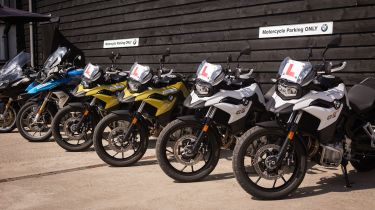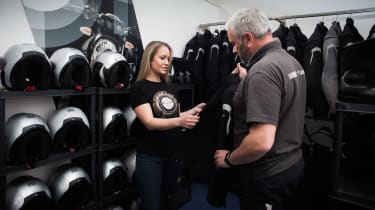Here’s what to do when searching for the best motorcycle training school near you
There are hundreds, if not thousands, of motorcycle training schools scattered across the United Kingdom, but a lot like restaurants, there are good ones, great ones and somewhat questionable ones. However, because there are no comparison tools or lists of the ‘best motorcycle training schools in [insert UK county here]’, it can be hard to know the quality of the teaching you’ll be receiving until it’s too late.
So to help you find the best motorcycle training school near you, here are the things you should be looking for and need to do, according to BMW Rider Training’s Head Instructor Ian Biederman:
Don’t just look at the website
The first and most important thing you can do is call the school you’re considering and ask if you can visit before booking the course. This will give you a chance to check out the facilities, meet the instructors and see what kind of equipment they provide, as well as the condition of it.
When visiting, make sure to ask about and ideally look at the motorcycle(s) you’ll be learning on to see what condition they’re in as well as their age.
If the school provides you with excuses why you can’t visit, that is not a good sign, so perhaps look elsewhere.
Ask how many hours of training the course involves
Ask roughly how much time you’ll spend on the course too, including on-road riding time. For example, BMW Rider Training’s seven-day direct access course we enrolled in consisted of approximately 50 hours of teaching, including both classroom and on-road time. However some other schools’ week-long courses can consist of nearly half as many hours of training, so it's worth getting at least an estimate of how much teaching you'll be getting for your money.
Find out the instructors’ level of certification
Discuss to what level the instructors at the school are certified to, especially the one(s) that’ll be teaching you. For instance, direct access qualified is the highest certification in the UK. On the other hand of the spectrum, ‘down trained’ means the school themselves say the instructor is good.
Down trained instructors can only teach CBT courses, but having instructors all trained to the highest standards is always reassuring and means you’re less likely to receive mixed messages or instructions if you progress to learning to ride bigger bikes and are then taught by more highly certified instructors.
Full day CBT courses
When it comes to CBT schools specifically, you should look for a school that provides a full day course at least, not a half day. And when it comes to the courses themselves, they should ideally have a 2:1 ratio of instructors and students. But for context, the industry standard is 4:1 for on-site training, and then 2:1 for the on-road session.
Speaking of which, you should make sure that the road session is at least two-hours long – you really don’t want them rushing this portion of course, even if it means they sign your certificate quicker.
Source: Read Full Article


